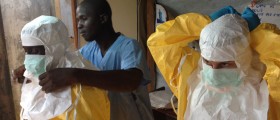
Mononucleosis, also known as “mono”, is a widespread viral disease most commonly seen in adolescents and young adults. The virus called the Epstein-Barr virus (EBV) is responsible for the development of mononucleosis. Older adults are usually immune to the EBV, because they already possess anti-bodies in their system.
Incubation period
Mononucleosis is most frequently being transmitted through saliva. This is why mononucleosis got its popular name the “kissing disease”. The other ways of transmission are sharing glasses, dishes and toothbrushes or eating utensil with someone who has the virus. Once the person gets in the contact with the virus, it takes some time before exhibiting any symptoms. This period is called the “incubation period”. Incubation period of Epstein-Barr virus is approximately 1 to 2 months. During this period, none of the symptoms of the disease will develop and the presence of the virus is fully unnoticeable. However, the carrier of the virus remains contagious no matter, if the disease is fully developed or not.
Signs and symptoms of mononucleosis
Symptoms of mononucleosis are more severe in older patients than in children. In children, this disease may develop without any symptoms and it usually goes away on its own and left unnoticed. However, in young adults and teenagers, the disease is followed with extreme fatigue and weakness. Patients may often complain about headaches, sore throat, pain in the muscles, chills and fever. After a couple of days this common symptoms may progress to swollen lymph nodes, yellow tinge to the skin and eyes, rashes on the face and body, bruise-like red spots inside the mouth and pain in the upper-left abdomen as a result of inflamed spleen.
Prognosis
The course of the disease varies from person to person. Usually, symptoms last from two to four weeks, but it is not uncommon to feel tired and exhausted for several weeks or longer. The key factor in treatment of mononucleosis is to get enough rest, and the symptoms will soon go away. This will support the immune system in fighting against the disease, and speed up the process of recovery.
Once when the virus develops in patients body it stays there to the rest of the person’s life. However, this doesn’t mean that the person stays contagious for the rest of their life. With time, virus becomes more and more inactive and eventually the person will not be contagious at all. There is no definitive answer to the question how long someone with mononucleosis stays contagious. Some studies report that a person can spread the infection for 18 months.

















Your thoughts on this
Loading...